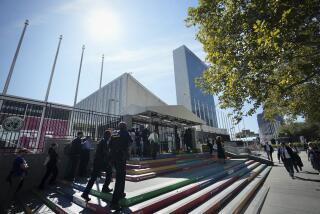Dealing With the Debt
- Share via
The annual meeting last week in Berlin of the International Monetary Fund and the World Bank gave new exposure to the urgent problem of the Third World debt and the difficulty of contriving a consensus among the major member-nations. In that sense, at least, the gathering dramatized the need for vigorous leadership from the next President of the United States.
To the extent that there was innovation from the industrialized nations, it was articulated by Japan and France. The new U.S. secretary of the treasury, Nicholas Brady, had to be content with a reaffirmation of the three-year-old proposals of his predecessor, James A. Baker III. Baker is now campaign chief for George Bush’s quest for the White House, and consistency was certainly appropriate politically.
Bush, in the initial presidential campaign debate, endorsed the Baker plan for resolving the Third World debt, hardly a surprise. When it was first spelled out, the plan was the right way to go, urging new credits matched with debtor-nation economic reforms and insisting on a country-by-country resolution of debts. Unfortunately, it has not worked. In both Latin America and Africa, there is a net out-flow of resources at the very moment when an in-flow is essential to economic growth. Michael Dukakis, during the same debate, dealt in generalities--”we’ve got to assist those Third World countries in dealing with this massive debt . . . . “--which served only to acknowledge the need for action.
Final approval by the House of Representatives of full U.S. participation in a $74.8-billion general capital increase for the World Bank coincided with the conclusion of the bank’s annual meeting. It was a welcome if regrettably delayed action that assures an even more vigorous lending program for the bank. The expanded capitalization is not without its debt connection, as was illustrated by a new $1.25-billion World Bank loan to Argentina, No. 3 after Brazil and Mexico among the developing-nation debtors. But most instructive in the House vote was the enormous support given by the American business community. U.S. corporations realize that there are good economic reasons, beyond the need to address the gross poverty of the world, and concomitant security risks. The developing nations buy about 40% of U.S. exports.
Barber B. Conable, president of the World Bank, deserves much of the credit for finally winning congressional approval for the expanded capital. He also deserves credit for keeping the eyes of the member-nations at the Berlin meeting focused on the real problem: poverty.
“Poverty on today’s scale prevents a billion people from having even minimally acceptable standards of living,” he told the delegates. “To allow every fifth human being on our planet to suffer such an existence is a moral outrage. It is more: It is bad economics, a terrible waste of precious development resources. Poverty destroys lives, human dignity and economic potential. It must be fought with resolution and overcome with sustainable growth.” That is something on which, surely, all the candidates can agree.
More to Read
Sign up for Essential California
The most important California stories and recommendations in your inbox every morning.
You may occasionally receive promotional content from the Los Angeles Times.













